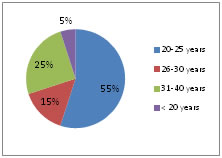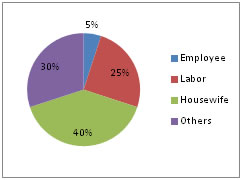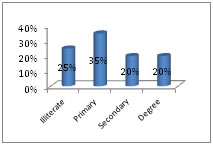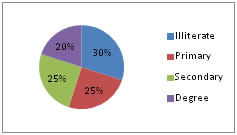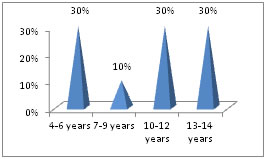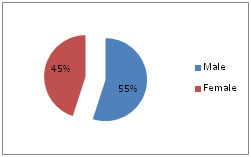Official Journals By StatPerson Publication
|
Table of Content - Volume 7 Issue 3 - September 2018
A study to assess the knowledge of mothers regarding the care of mentally challenged children in selected schools at Guntur, Andhra Pradesh
Venkata Kiran Vaddadi1, Nukala Srikrishna2*, Mounika Bollu3
1Assistant Professor, Department of Psychiatry, Government General Hospital, Guntur, Andhra Pradesh, INDIA. 2Professor, Department of Psychiatry, Gitam Institute of Medical Sciences and Research, Rushikonda, Visakhapatnam, Andhra Pradesh, INDIA. 3Department of Pharmacy, Chalapathi institute of pharmaceutical sciences, Guntur, Andhra Pradesh, INDIA.
Abstract Background: Mental handicap is the present term used for mental retardation which is a condition of sub average intellectual functioning combined with deficit in adaptive behaviour. Mothers who are primary care providers for children with mental disability face many challenges. In India 5 out of 1000 children are mentally retarded. By doing studies related to the care of mentally challenged children, we understand the awareness in mothers regarding the planning and approach to management of mentally challenged children. Aim: To assess the knowledge of mothers regarding the care of mentally challenged children and to find out association between knowledge of mothers with selected demographic variables. Method: Non - experimental descriptive study was conducted on mothers of mentally challenged children using a self prepared knowledge questionnaire on mental retardation and care of child. Results: 23.3% of the sample had moderately adequate knowledge and 76.6% had adequate knowledge. Conclusion: Mothers with mentally challenged children should be educated about the impact of mental retardation and care of children affected by it. Keywords: Knowledge, Mothers, Mentally challenged
Globalization and industrialization, new life style activities, smoking, alcoholism, late marriages increases the incidence of mental retardation. Mental handicap is the present term used for mental retardation which is a condition of sub average intellectual function combined with deficit in adaptive behaviour. Primary cause is genetics it was incurable. The belief was once retarded always retarded, nothing can be done. Mothers who are primary care providers for children with mental disabilities face many challenges and stressors. In traditional days majority of the persons with mental retardation were cared by their families but in today’s modern society many factors like change in social system (e.g., breaking up of joint families), the economic system (e.g., unemployment ) etc have contribute to the stress, that parents of mentally retarded children experience. Compared with fathers, mothers of disabled children spend more time for providing care, support and perceived more care giving burden. The behaviour and health of the children had a greater impact on mothers than the fathers. Mothers are under more pressure to balance children needs, household care and physical support. Mothers perception of lives with children with intellectual disability founded six major themes, challenging the process of acceptance, painful emotional reactions, the interrelatedness of mothers health and child’s wellbeing, struggle to deal with oneself or the child, inadequate support from the family. Mental retardation means a delay or insufficient development of capabilities and associated behavioural abnormalities in comparison to normal one’s of the same age. Worldwide it’s prevalence is 2.5% to 30%. In india, 5 out of 1000 children are mentally retarded, it is one of the leading problem in the developed as well as developing countries. By doing studies related to the care of mentally challenged children. we can bring the awareness in mothers regarding the planning of educational programmes in the special schools where childrens will be trained about how to read and write and to develop the best of their ability. Vocational training centres, day care centres, halfway homes will help the mothers for improving the physical and mental growth of the children. MATERIAL AND METHODS Research Design: Non experimental descriptive study design Sample: 60 mothers with mentally challenged children under the age of 15 years. Inclusion Criteria: Mothers having children under 15years of age. Mothers who are willing to participate in the study. Mothers who were available at the time of data collection’. Mothers who can understand and communicate in local (telugu) language. Exclusion Criteria: Mothers who were not willing to participate in the study. The pilot study samples were excluded from the study. Description of the tool for data collection The tool for data collection used for the present study included two parts-the demographic data, self prepared structured questionnaire on knowledge and care of mentally challenged children. Part-I : Consists of age, occupation of mothers, educational qualification of mothers and fathers, type of family, socioeconomic status of family, age of child, sex of child, number of children in the family, type of marriage, type of delivery Part-II : Self prepared knowledge questionnaire on mental retardation and care of child with mental retardation The structured questionnaire consists of 30 multiple choice questions related to mental retardation, causes, symptoms, diagnostic tests, skin care, activities of daily living, diet, eating pattern, elimination pattern, play. each right answer carries a score of one thus the total score is 30. Score interpretation: Inadequate knowledge <0-33%, Moderately adequate knowledge 34-65%, adequate knowledge >66%. Pilot study was done on 6 mothers and the tool was tested for reliability. After pilot study age group of the children was modified i.e., 4-15 years. The data was collected from 60 mothers and analyzed using relevant descriptive statistics and was presented in following sections. Section I: Description of demographic variables of mothers. Section II: Description of mothers knowledge in terms of percentage Section III: Description of association between mothers knowledge with selected demographic variables. Section I: Description of demographic variables of mothers.Table 1: Frequency and percentage distribution of sample according to the age of mothers
Figure 1:
Table 2: Frequency and percentage distribution of sample according to the occupation of mothers
Figure 2:
Table 3: Frequency and percentage distribution of sample according to the education of mothers
Figure 3:
Table 4: Frequency and percentage distribution of sample according to the education of father
Figure 4:
Table 5: Frequency and percentage distribution of sample according to the type of family
Table 6: Frequency and percentage distribution of sample according to the socioeconomic status of family
Table 7: Frequency and percentage distribution of sample according to the age of the child
Figure 5: Table 8: Frequency and percentage distribution of sample according to the sex of the child
Figure 6: Table 9: Frequency and percentage distribution of sample according to the number of children in the family
Table 10: Frequency and percentage distribution of sample according to the type of marriage
Table 11: Frequency and percentage distribution of sample according to the type of delivery of mother
Section II: Description of mothers knowledge in terms of percentage. Frequency and percentage distribution according to the level of knowledge of mother on care of mentally challenged children. Table 12:
Table 13: Description of association between mothers knowledge with selected demographic variables
Discussion The discussion is based on the objective, findings of the study and literature review. The problem stated is to assess the knowledge of mothers regarding care of mentally challenged children in selected school in Guntur, A.P. The distribution of sample subjects in present study by age,33 (55%) were in the age group of 20-25 years, 9 (15%) in the age group of 26-30 years,15 (25%) in the age group of 31-40 years and 3 (5%) in the age group of <20 years. The distribution of sample subjects, Majority (40%) of the subjects were housewives and 5% were employed. Results of the current study states that 15 (25%) mothers were illiterates, 21(35%) belong to primary education 12 (20%) belongs to secondary education and 12(20%) were completed their degree. Majority (30%) of the fathers of mentally retarded children in this study were illiterates and less number of them have completed their degree. The distribution of sample subjects by type of family i.e., in the type of family 18(30%) belongs to joint family, 27(45%) belongs to the nuclear family, 6 (10%) belong to the extended family, 9(15%) belongs to the broken family. The distribution of sample subjects by socioeconomic status i.e., in the socioeconomic status of family 21 (35%) are poor, 3(5%) are rich 36(60%) are middle class. 30% of the children’s were in the age group of 4-6 years, 10% were in the age group of 7-9 years, 30% belongs to the age of 10-12 years and 30% were having the age of 13-14 years. 33 (55%) of the child were males and 27(45%) were females. In the current study, 21 (35%) are married by consanguinity, 39 (65%) were married by non consanguinity. out of 60, 3 (5%) mothers are having one child, 30 (50%) are having two children 15 (25%) were having three and 12 (20%) have 4 or more than four children. 33 (55%) of the child are delivered by normal, 15 (25%) were delivered by operational and 12(20%) are delivered by instrumental techniques. From the analysis, it was found that 23.3% of the sample had moderately adequate knowledge, 76.6% had adequate knowledge. the first objective was to assess the knowledge of mothers regarding mentally retarded children. it revealed that the samples have the 76.6% adequate knowledge about the care of mentally challenged children. In the present study, it was found that There is a significant relationship between the knowledge of mothers with occupation of mother. There is no significant relationship between the knowledge of mothers with age, education of mother, education of father, type of family, socioeconomic status of family, age of child, sex of child, number of children in the family, type of marriage, type of delivery.
Conclusion Mentally challenged is below average general intellectual functioning, originating during the development period and association with impairment in adaptive behaviour. With the birth of a disabled child, mothers were requesting to experience complex feelings. Mothers with mentally challenged children should be educated about the significance of mental retardation and care of child with mental retardation. Special educations and early interventional measures should be more extensive and it should be available to support mothers. The results of this study show the need of referring mothers to specialists for deepening their diagnostic knowledge and professional consultation on stress management.
REFERENCES
|
|
 Home
Home
